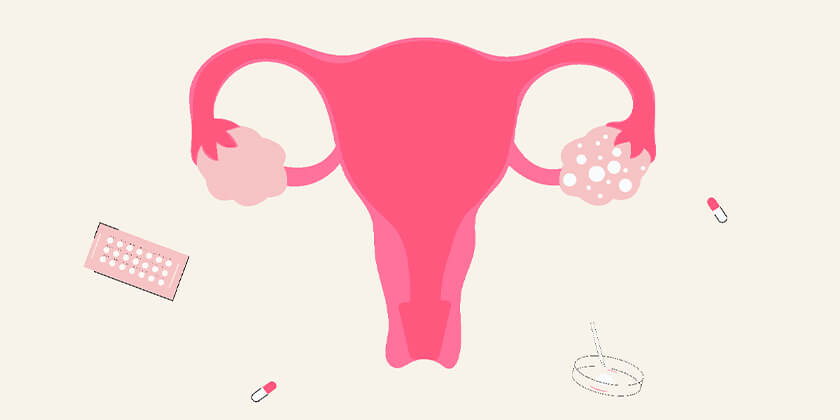Here are 3 Major changes you must make to stay away from PCOS
Tue 09 Jan 2024, 00:07:50

Polycystic Ovary Syndrome (PCOS) is a common hormonal disorder that affects millions of women worldwide. It can lead to a range of health issues, including irregular periods, weight gain, insulin resistance, and fertility problems. While there's no cure for PCOS, making certain lifestyle changes can improve your symptoms and well-being. Celebrity Pilates Master Instructor Yasmin Karachiwal shares three major changes you can make in your life to help manage and potentially keep PCOS symptoms at bay:
Embrace a Balanced Diet
One of the most effective ways to help reverse PCOS symptoms is by adopting a balanced and healthy diet. Here are some changes and additions you can make to your daily diet to start with:
Low-Glycemic Index (GI) Foods: Opt for foods with a low GI, such as whole grains, leafy greens, lean proteins, and legumes. These foods help stabilize blood sugar levels and reduce insulin resistance, a common issue in PCOS.
Limit Processed Foods: Cut back on highly processed and sugary foods, including fast food, soda, and snacks. These foods can exacerbate PCOS symptoms and contribute to weight gain. Avoiding processed food and opting for healthier snacks like almonds can be a great addition to your diet. Snacking on almonds as a mid-morning snack, compared to crackers with equivalent energy, reported a lower overall hunger drive.
Moderate Carbohydrate Intake: Be mindful of your carbohydrate consumption and choose complex carbohydrates like sweet potatoes, quinoa, and brown rice over refined options like white bread and pasta.
Healthy Fats: Incorporate sources of healthy fats, such as avocados, nuts, seeds, and fatty fish, into your diet. These fats can support hormone regulation and reduce inflammation. Another one of such valuable and helpful foods you can include is almonds, they are a rich source of protein, a nutrient that is not only energy-yielding but also known to contribute to the growth and maintenance of muscle mass. According to FSSAI, for a normal adult, 20-30% of a
day's total calories should come from fats. Almonds are a good source of healthy fats and should be included as part of a balanced diet along with other foods.
day's total calories should come from fats. Almonds are a good source of healthy fats and should be included as part of a balanced diet along with other foods.
Stay Hydrated: Drink plenty of water to support overall health and assist in detoxification processes.
Regular Exercise:
Exercise plays a crucial role in managing PCOS. It helps control weight, improve insulin sensitivity, and reduce stress. Start by incorporating the following into your daily routine:
Cardiovascular Exercise: Engage in at least 150 minutes of moderate-intensity aerobic activity or 75 minutes of vigorous-intensity aerobic activity per week. This can include brisk walking, jogging, swimming, pilates, or cycling.
Strength Training: Incorporate strength training exercises at least two days a week to build lean muscle mass and boost your metabolism.
Prioritize Sleep and Manage Stress
Adequate sleep and stress management are essential components of PCOS management. Here's how to incorporate these changes into your daily life:
Prioritise Sleep: Aim for 7-9 hours of quality sleep each night. A consistent sleep schedule can help regulate hormonal balance.
Stress Management: Find healthy ways to manage stress, such as through mindfulness, relaxation techniques, or talking to a therapist. High-stress levels can exacerbate PCOS symptoms. A study by researchers at King’s College London found that almond snacking led to improved heart rate variability in response to mental stress.
Set Realistic Goals: Don't overwhelm yourself with too many changes at once. Set achievable goals and focus on gradual improvements in your lifestyle.
Remember that it's essential to consult with a healthcare professional or a registered dietitian to tailor your approach to your specific needs and monitor your progress. With commitment and the right strategies, you can gain control over PCOS and lead a healthier, more fulfilling life.
No Comments For This Post, Be first to write a Comment.
Most viewed from Health
AIMIM News
Latest Urdu News
Most Viewed
May 26, 2020
Do you think Canada-India relations will improve under New PM Mark Carney?
Latest Videos View All
Like Us
Home
About Us
Advertise With Us
All Polls
Epaper Archives
Privacy Policy
Contact Us
Download Etemaad App
© 2025 Etemaad Daily News, All Rights Reserved.






























